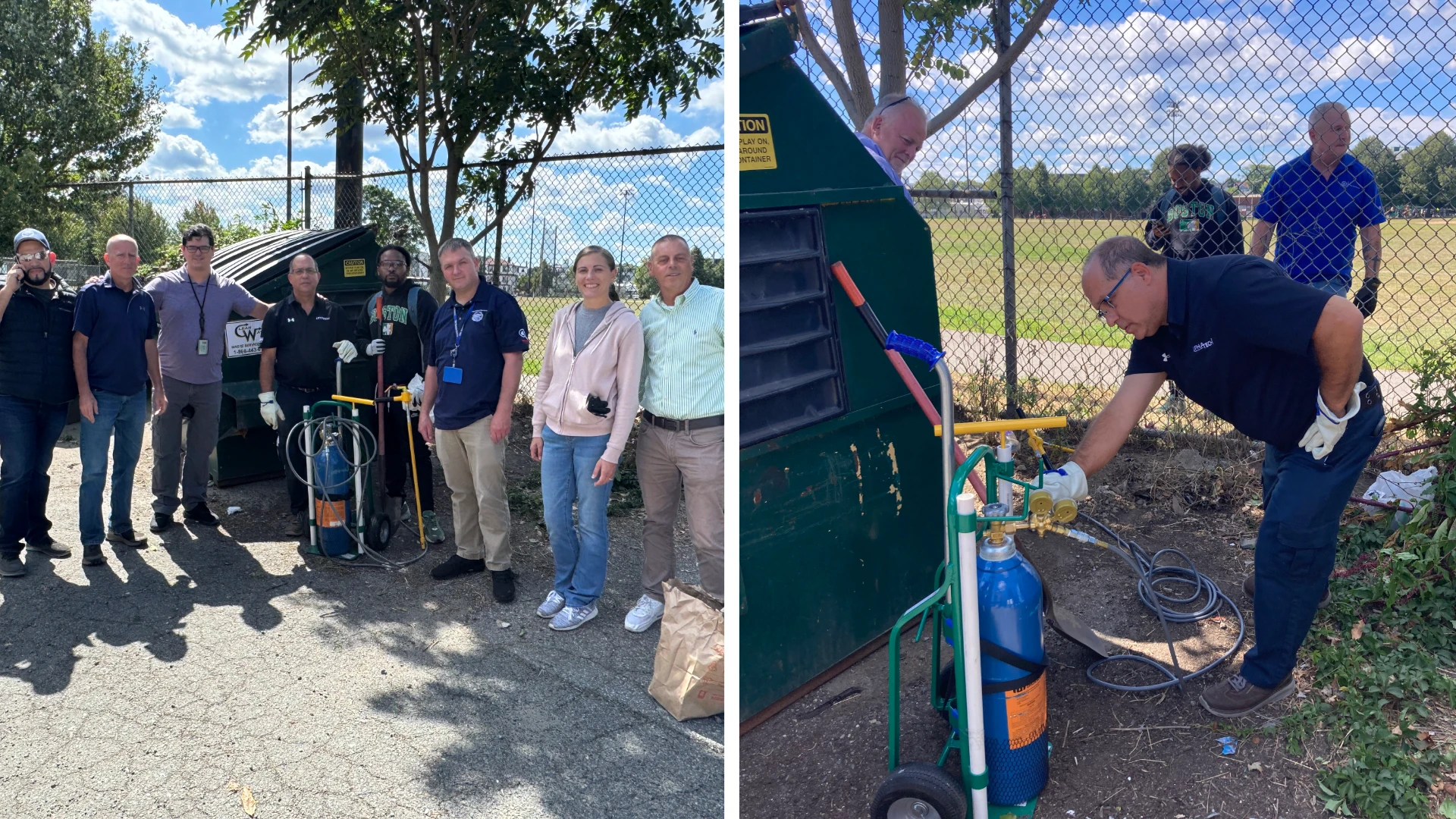Some things seem beyond our control…weather, competitors, consumer spending, regulations, even access to qualified new hires.
Instead of getting pushed this way and that, experts suggest aligning your business to capitalize on these issues — or at least prepare for the inevitable.
Weather or Not. Looking back, 2010 was a year of extremes. A developing drought across parts of the South worsened, and record flooding hit areas from Texas to Massachusetts, said meteorologist Dr. Greg Forbes, severe weather expert at The Weather Channel.
Flooding in Iowa spawned a harsh season for Aedes and Culex mosquitoes and biting gnats, said National Pest Management Technical Director Dr. Stuart Mitchell. Some areas saw more odorous house and pavement ant problems, and increased activity from displaced rats, mice and snakes.
Heavy rains in Texas resulted in mosquito pressure "greater than what we had seen" in the last two years, reported Karl Kisner, marketing director for Univar USA, Austin, Texas.
Five years of Southeast drought had some impact on termite colonies, according to Dr. Phil Koehler, University of Florida entomologist. If weather conditions aren’t right, swarmers shed wings in the colony and crawl out to start colonies nearby.
In 2010, the region had a wetter spring and summer and swarming was better, though still spotty, he said. PMPs may start to see swarm activity increase in the next few years if normal rainfall persists.
So what’s in store for 2011? Colder-than-normal winter temperatures in the East, near-normal temps for the central U.S., and milder-than-normal temps out West, predicted the Farmers’ Almanac.
"Copious amounts" of winter precipitation will hit the Gulf Coast and Southeast, snowier-than-normal conditions are forecasted for the Northern and Central Plains and Ohio River and Great Lakes region, and above-normal precipitation is expected in the Pacific Northwest.
2011’s summer will be hot and wet with heavy thunderstorm activity along the East Coast; very warm with average rainfall in the Great Lakes region; average rainfall and temperatures in the West; hot with average rainfall in the Southwest; and cool with average rainfall in the Northwest, said Farmers’ Almanac Managing Editor Sandi Duncan.
What to Do: Professionals can’t use weather as an excuse if numbers are off, even if it’s a reality, Kisner said. Keep an eye to the sky, schedule jobs accordingly, prepare for seasonal pest changes, and adjust treatment methodologies as needed.
M&A Madness. In recent months there’s been a frenzy of merger and acquisition activity.
There was a "massive push like I’ve never seen before," said The Potomac Company M&A Director Paul Giannamore. He had more transactions close in 2010 than he’s had in the last six or seven years, and expects five or six PCT Top 100 companies to be "out the door" in 2011.
For the first time in 15 years, it was a "fantastic buyers market," said Joey Edwards, president of J. Edwards Services in Atlanta.
Why? Uncertainty about long-term capital gains taxes and whether Congress would raise rates in 2011 motivated some sellers. Higher taxes would cost sellers a significant amount of money.
Slow economic recovery also played a role. In 2008 and 2009, PMPs sat on the sidelines and waited for the economy to improve. But "there comes a point where it just doesn’t make sense to wait any more," said Giannamore.
Some changed their price expectations and sold while their business had value, said Lance Tullius, a partner at Tullius Partners in Portland, Ore.
Five years ago, buyers paid $1.50 to $2 on annual revenue, said Edwards. Now, they’re paying at annual revenue or a little less depending on the recurring revenue ratio.
Large organizations had the cash to buy and focused on "expansion and growth as opposed to preservation," said Tullius. "Cash is like inventory. They have to deploy it."
This allowed national companies, in particular, to expand their footprints and customer base, and acquire "some really experienced talent," Edwards said.
In 2011, Tullius said M&A activity will "accelerate and heighten," regardless of what happens with capital gains.
Arrow Exterminators Corporate Development Officer Kevin Burns in Atlanta said the economy will dictate activity. A good economy will motivate those sellers who held back during the recession to move while the company’s value is better. Arrow already has deals scheduled for next year, he said.
Giannamore is unsure. "There’ll be conflicting fundamentals and industry forces."
All agreed private equity firms will continue to look for the right sellers. This validates the industry’s health and long-term prospects, said Tullius.
What to Do: Facing a "new" competitor with a bigger marketing budget may require you to make strategic adjustments. See "Spending" for marketing messages that resonate with post-recession consumers.
Want to sell your business? It’s never too early to prepare your exit strategy. Get a third-party perspective. Buyers: Look for diversified companies with talent and strong recurring revenue. Due diligence is a necessity and may require expert help.
*****
As Climate Changes,
So Do Pests
According to Dr. Greg Forbes, severe weather expert at The Weather Channel, "there’s little doubt" our climate is warming up. Most of the warmest years on record have occurred in the last 15 years, and the number of record highs exceeds the number of record lows two to one on a daily basis, he said.
Last year’s winter tornadoes in Chicago, Oklahoma City and Pennsylvania — spawned by warm, moist air in areas that normally don’t expect it — are getting more common.
The increase in temperature is making once too-cold areas more amenable to pests. "The migration of temperatures northward into areas that typically were colder will allow migration of pests into areas where they were not so common," said Forbes.
According to the World Wildlife Fund, warming will enable deer ticks to expand their range 68 percent in North America by later this century.
Mosquito-borne tropical diseases like dengue also may thrive. "Scientists project that within this century about 35 percent of the global population could be at risk of dengue transmission, but this increases to 50 to 60 percent when global warming is taken into account," the organization said.
Fire ants are marching northward as well. University of Florida entomologist Dr. Phil Koehler said the pests are now as far north as Virginia.
Warmer temps are giving a boost to new termite species brought into the country. When Koehler began working at the University of Florida, 13 termite species existed in the state. That number has almost doubled in 35 years.
Forbes said experts predict dry areas will get drier and infrequent rain events will produce heavier, ½- to 1-inch rains. "These are the kind of rains that leave standing water about" and potentially breed mosquitoes.
Long-term changes in precipitation and temperature patterns will change soil conditions and vegetation, and may cause "behavioral shifts in certain pests," said National Pest Management Association Technical Director Dr. Stuart Mitchell, BCE.
University of California, Riverside entomologist Peter Atkinson is studying genetic diversity in insects to predict how they might adapt to climate change. History shows changes in pest insect distribution can profoundly affect agriculture and health. "So we need to ‘get ahead’ of the question and determine, using data, the likelihood of climate change affecting the distribution of given pest species."
*****
Spending: on the Slow side. Economic optimism may be growing, but consumer spending isn’t. An October Associated Press survey of 43 leading economists said shoppers will boost their spending 2.5 percent in 2011, slightly better than 2010 but less than what economists forecasted in July.
Weak job gains, persistently high unemployment, and negligible growth in household net worth will keep consumer spending modest, reported the National Association for Business Economics.
As a result, consumers are "making trade-offs" and choosing value, not the cheapest or most expensive options, said Chris Fedorczak, brand planner at The Richards Group in Dallas.
They seek expertise, value and the assurance you stand behind your service. Customers want to feel they’re being smart with their money, he said.
Stewart James, vice president of All City Lawn & Pest Control in Hollywood, Fla., provides value-added extras like free lawn sprays with certain plans and discounts on annual pest service. He’s confident "once they have us they won’t want to get rid of us."
Ray Sobrino Jr., owner of Sobrino’s Termite and Pest in Newbury Park, Calif., touts his extended warranty service plans and the convenience of his alternative termite treatments.
Consumers are spending more time doing research, and "the brand with the better information will win," said a recent Ogilvy & Mather study.
Positive reviews are important, too. Consumers want to engage with a reputable company and reputable people, explained Fedorczak. Sobrino’s prospects check referral websites and get feedback from previous customers.
James is optimistic. He launched a new marketing plan with re-designed collateral and website, vanity phone number, decal-wrapped trucks and search engine optimization.
Not everyone feels the same. A recent PCT survey found 33 percent of PMPs planned to decrease their current business development expenses. Twenty-nine percent were undecided, 26 percent planned no changes, and 12 percent expected to increase spending.
What to Do: Give customers what they want: information, reviews and value. It’s essential to care for customers at every step in the process, from initial inquiry to post-service follow up, Fedorczak said. Please them at every point of interaction.
Clean Water and Bed Bugs. By April 2011, 45 states must adopt general pesticide permit requirements similar to those proposed by the U.S. Environmental Protection Agency under the Clean Water Act.
EPA’s proposal targets those using pesticides to control aquatic weeds and invasive aquatic species, mosquitoes and flying insects over widespread areas, and forest canopy pests. It won’t pose a problem for most PMPs, said NPMA Senior Vice President Bob Rosenberg.
States, however, may adopt permit requirements that go beyond EPA recommendations. Maine indicated it will require anyone applying pesticide near water to have a permit. This could result in a "huge paperwork burden" and even entail water quality monitoring, said Rosenberg. "It has the potential to have a very real impact on day-to-day operations."
Other states may follow Maine’s lead, Rosenberg said. "Between now and April, there’s going to be a flurry of state legislative activity to develop these state water permits."
This year also will see a jump in bed bug legislation, said NPMA Government Affairs Director Gene Harrington. Up to 10 states could consider laws addressing issues like notification, prevention, and the allowed time between finding the pests and treating for them in multi-family housing units, schools and hotels/motels.
Some provisions may limit treatment to professionals and require tenants to give PMPs access to units for inspection and treatment, but the impact on the industry "remains to be seen." Harrington said bed bugs also could be added to real estate disclosure forms.
In 2010, Maine and New York passed bed bug laws. Arizona, Alabama, New Jersey and Ohio proposed legislation. Illinois created a task force and likely will vote on legislation in 2012. Protecting low- and fixed-income people and the hospitality/tourism industries are driving forces behind the push, said Harrington.
What To Do: The clock is ticking on state pesticide-water permit deadlines. Get active in your state association and talk to regulators at your state environmental agency, which is charged with this task. Lack of action could put the industry in jeopardy, said Rosenberg.
Bed bug laws likely won’t target PMPs, but may impact clients. "It is important to be involved in these debates," Harrington said.
*****
Regs, Regs and More Regs
State legislators may have the itch to pass bed bug laws, but other regulatory issues deserve pest management professionals’ attention, too.
More states likely will pass laws banning pesticides on school grounds and athletic fields, similar to the ones New York passed last July and Connecticut passed in 2007, said NPMA Government Affairs Director Gene Harrington.
California likely will push for a mandatory school Integrated Pest Management bill again. Governor Schwarzenegger has vetoed the bill.
Maryland may consider full-use reporting measures requiring commercial applicators to submit complete records to its regulatory agency, but the bill’s high cost is "not an easy sell these days."
Harrington expects the California Department of Pesticide Regulation to make recommendations concerning pyrethroids and water quality in late 2011 or early 2012. "What happens in California definitely has a chance to influence what EPA does" in the current pyrethroid registration review process.
He also said local activist groups will continue to push for anti-pesticide laws even though municipalities don’t have the resources to enforce them. Case in point: Employees of Marin County, Calif., violated the county’s 1998 law banning the use of carcinogenic pesticides 269 times between 1999 and 2008, according to the Pacific Sun.
*****
Employees Could Walk. Last year’s slow economy and high unemployment opened more eyes to the industry’s stability and career opportunities, said Orkin Recruiting and Talent Management Director Ruby Swann.
But overall, the workforce was stable as most people clung to jobs, said Jean Seawright, president of Seawright & Associates in Winter Park, Fla.
PMPs had a higher volume of people responding to open positions. Unfortunately, the caliber of applicants wasn’t always top-notch, Seawright said. It took longer to work through candidates to find the right person and "the quality of their hire process really came into play."
NPMA’s Mitchell said regional and smaller firms are getting more sophisticated in their recruiting and hiring. A growing number reach out to college recruiting offices, offer internships, participate in job fairs and advertise positions online. Competitive salaries help.
PMPs may need all the help they can get in areas where employment is improving. Seawright said industry studies report 40 to 60 percent of workers want to make a job change. Younger workers, in particular, associate recent economic misery with their current employer.
"Our concern is, once things do begin to turn around, the talented people may start looking for another job," she said.
Employers have been unable to fill three million jobs despite the country’s 15 million unemployed, Seawright added. Talented people — when they’re ready to make a change — have opportunities.
Swann said research indicates private sector service and manufacturing hiring will rise through 2011. The U.S. Department of Labor said pest control employment will grow 15 percent between 2008 and 2018, faster than the average for all occupations.
What to Do: Create a "culture of engagement" to help retain talent, said Seawright. Look hard at pay practices, employee benefits and the strength of your leadership team.
When hiring, keep an open mind and focus on the candidate’s skill set, customer service experience and work history, said Swann. Orkin taps talent from many industries. Emphasize your company’s stability, training and career paths. Let candidates know previous pest control experience isn’t required, Swann advised.
The author is a frequent contributor to PCT magazine. She can be reached at anagro@giemedia.com.
*****
WINTER 2011
The Pacific Northwest should brace for a colder and wetter-than-average winter, while most of the South and Southeast will be warmer and drier than average through February 2011, reported the National Oceanic and Atmospheric Administration’s Climate Prediction Center.
A moderate to strong La Niña, associated with cooler-than-normal water temperatures in the Equatorial Pacific Ocean, will be the dominant climate factor influencing weather across most the U.S. this winter.
What’s the forecast for your neck of the woods?
- Pacific Northwest: colder and wetter than average
- California and the Southwest: warmer and drier than average
- Northern Plains: colder and wetter than average
- Southern Plains, Gulf Coast States & Southeast: warmer and drier than average
- Florida: drier than average, with an equal chance for above-, near-, or below-normal temperatures
- Northeast and Mid-Atlantic: equal chances for above-, near-, or below-normal temperatures and precipitation
- Ohio and Tennessee Valleys: warmer and wetter than average
- Central U.S.: equal chances of above-, near-, or below-normal temperatures and precipitation
- Hawaii: drier than normal through November, then wetter than normal December through February
- Alaska: odds favor colder-than-average temperatures with equal chances of above- or below-normal precipitation

Explore the December 2010 Issue
Check out more from this issue and find your next story to read.
Latest from Pest Control Technology
- Rentokil Terminix Expanded in Key Markets with 2024 Acquisitions
- In Memoriam: Joe Cavender
- Certus Acquires Green Wave Pest Solutions
- Liphatech Adds Alex Blahnik to Technical Team
- Do the Right Sting: Stinging Insect Identification, Management, and Safety
- VAGA's 8th Annual Veterans Thanksgiving Appreciation Dinner
- Clark's Blair Smith on the Response to Increased Dengue Fever Cases in Southern California
- WSDA, USDA Announce Eradication of Northern Giant Hornet from U.S.





